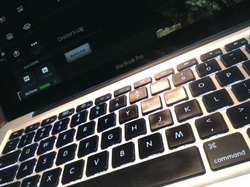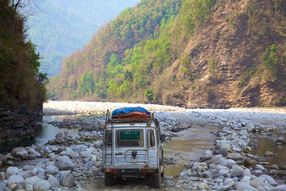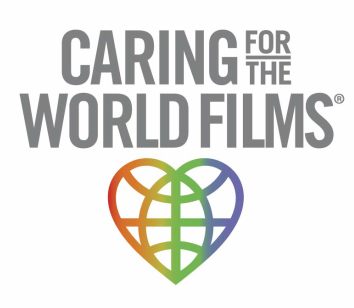
The internet can be a wonderful vehicle for sharing thoughts and ideas, however, it can be an unintentional weapon used to launch shards of inaccuracies and untruths. The collateral damage of such careless postings can result in irreversible damage to those in its wake. It is not uncommon to find negative information on organizations I am researching. Positive or negative, I always search for original sourcing to confirm anything I dig up. Sometimes, the organizations I profile get rattled because I’m not simply reworking their official public relations statements. I have to remind them that objectivity is a virtue, not a vice. Confirm, confirm, confirm… always. It is fundamental to confirm facts of an interview or story and this includes blogs.
One does not have to be a Pulitzer-Prize-winning journalist to spot a poorly researched article or blog. Recently, I came across a blog that was very critical of a non-governmental organization (NGO) that I have been researching for several years. It was not clear why the post was written, other than to share information about a hospital in a developing country. It appeared to be a travel blog.
The first red flag I found was the author was anonymous and he did not indicate the purpose of the article. The author presented himself as an observer of a visiting volunteer physician conducting rounds at a private hospital in an developing region of the world. His post was based on a conversation he had with this doctor, but he provided no context. Although a small amount of information was provided about the doctor, there were no specifics related to the hospital. The body of this article contained a list of complaints by the volunteer physician followed by a few vague insights by the author.
The blogger indicated he was only with the physician for a few hours and did not offer his personal observations to validate the complaints he wrote about, nor did he offer evidence of fact checking. Furthermore, there was no indication that he contacted the hospital or non-profit organization to clarify issues he mentioned nor did he offer an opportunity for rebuttal.
I was able to track down the author fairly easily. It turns out, he is a medical student participating in a research project for his university. The purpose of the blog was to share information with fellow project team members. The blog settings made it available to the world. I learned he had very little experience in third world medicine and the challenges associated with humanitarian missions. I confirmed he had not conducted fact checking, had no support documentation or personal observations to validate any of the incidents cited in his blog, nor did he pursue attempts to contact the NGO. In fact, I was asked by the author not to share his contact information with the members of the NGO.
Critics of my point here will trumpet the First Amendment. I am a journalist. I live, breath and base my career on First Amendment protection. However, with this right comes responsibility. Free speech has consequences. Let me be clear, I am not defending the NGO or the hospital. I am stating facts I discovered in my own research to get to the truth of his article.
If you post an inflammatory and defamatory “interview,” there is an obligation to dig deeper to confirm the facts from solid sources. The blogger admits he did not feel the need to confirm the information or offer the NGO an opportunity for public rebuttal.
I contacted officials of the NGO to get their side of the story. As expected, they had no idea this article had been posted, but were aware of the physician in question and the situation surrounding his comments. Had the author of this article taken a few minutes to contact the organization for a response, he would have gained valuable insight into the world of humanitarian missions conducted in remote regions. It is reasonable to believe that the entire tone of his blog would have been completely different and would have been much more helpful to his colleagues. Remember, he claimed his blog was to provide "in the trenches" insight to his fellow team members. Why would he not take the extra steps to clarify what he perceived to be troubling issues?
The blogger provided a link to the organization’s annual report, Globe Med and one of my blogs about the founder of the non-profit. Had he done a simple Google search, he would have discovered a well-researched article about the hospital in question which address the exact challenges the volunteer physician complained about.
The first red flag I found was the author was anonymous and he did not indicate the purpose of the article. The author presented himself as an observer of a visiting volunteer physician conducting rounds at a private hospital in an developing region of the world. His post was based on a conversation he had with this doctor, but he provided no context. Although a small amount of information was provided about the doctor, there were no specifics related to the hospital. The body of this article contained a list of complaints by the volunteer physician followed by a few vague insights by the author.
The blogger indicated he was only with the physician for a few hours and did not offer his personal observations to validate the complaints he wrote about, nor did he offer evidence of fact checking. Furthermore, there was no indication that he contacted the hospital or non-profit organization to clarify issues he mentioned nor did he offer an opportunity for rebuttal.
I was able to track down the author fairly easily. It turns out, he is a medical student participating in a research project for his university. The purpose of the blog was to share information with fellow project team members. The blog settings made it available to the world. I learned he had very little experience in third world medicine and the challenges associated with humanitarian missions. I confirmed he had not conducted fact checking, had no support documentation or personal observations to validate any of the incidents cited in his blog, nor did he pursue attempts to contact the NGO. In fact, I was asked by the author not to share his contact information with the members of the NGO.
Critics of my point here will trumpet the First Amendment. I am a journalist. I live, breath and base my career on First Amendment protection. However, with this right comes responsibility. Free speech has consequences. Let me be clear, I am not defending the NGO or the hospital. I am stating facts I discovered in my own research to get to the truth of his article.
If you post an inflammatory and defamatory “interview,” there is an obligation to dig deeper to confirm the facts from solid sources. The blogger admits he did not feel the need to confirm the information or offer the NGO an opportunity for public rebuttal.
I contacted officials of the NGO to get their side of the story. As expected, they had no idea this article had been posted, but were aware of the physician in question and the situation surrounding his comments. Had the author of this article taken a few minutes to contact the organization for a response, he would have gained valuable insight into the world of humanitarian missions conducted in remote regions. It is reasonable to believe that the entire tone of his blog would have been completely different and would have been much more helpful to his colleagues. Remember, he claimed his blog was to provide "in the trenches" insight to his fellow team members. Why would he not take the extra steps to clarify what he perceived to be troubling issues?
The blogger provided a link to the organization’s annual report, Globe Med and one of my blogs about the founder of the non-profit. Had he done a simple Google search, he would have discovered a well-researched article about the hospital in question which address the exact challenges the volunteer physician complained about.

For instance, the blogger writes that the man is being held against his will. This is quite an alarming claim. Natural curiosity would lead one to dig a little deeper. I asked the blogger exactly what was said to lead him to believe this man was being held against his will. A few more questions clarified that this man was not held against his will at all, but in fact could leave at anytime, however conditions and caseload made it difficult. What the physician said was that "he felt like he was stuck." First of all, the hospital is located in an isolated region of Nepal where roads are often washed out during rainy season. The physician, unfortunately, selected monsoon season to volunteer. Monsoon season is a torturous time to be anywhere, let alone, in remote regions of Nepal . This clearly makes travel by vehicle challenging. The volunteer certainly could leave anytime he wanted to, however, he would have to walk, just as the locals do. The NGO also provided sleeping quarters at the hospital for its volunteers and physicians. This may also explain why the physician felt he was "stuck." If one is sleeping, eating and working 24/7 in the same place, it can be challenging to relax and can lead to severe stress and possibly depression. The NGO discloses these challenges to all volunteers who commit for the three month assignment. Based on these conditions, it is easy to understand the isolation the volunteer experienced.
The article also discloses that the physician complained about shortages of medicines and supplies. Welcome to third world medicine. Supply and medicine shortages are a normal part of life in developing countries. Add monsoon season with its washed out roads, political unrest and government delays and it is a miracle any supplies get in. Considering these challenges, from my exhaustive research and extensive in the trenches observations, this NGO scores high in execution.
The doctor complained about high case loads. Again, monsoon season is the primary culprit. Continuously wet conditions cause many more illnesses and injuries than dry season, hence a higher than normal caseload. Additionally, when a foreign doctor is posted at this hospital, there is a huge surge in patient volume. The locals trust the foreign physicians more than the local physicians. By asking a few pointed questions, the blogger would have discovered this and could have provided insight in the context of the article. Obviously, anyone interested in volunteering in a developing country, especially during monsoon season, should consider challenges such as weather, isolation and caseload before committing to a long term assignment.
Another very inflammatory quote he had in his blog was the visiting physician believed there was "financial funny business" in the works at the hospital. The doctor incorrectly assumed the healthcare was free to all patients. The fact is, the hospital has a sliding scale payment policy, which is clearly posted on signs throughout the hospital (in Nepalese) The blogger easily could have confirmed the doctor's concerns with the NGO, patients or hospital workers. He also could have accessed the organization's website for financial information. Had he done this, he would have discovered that the NGO goes through two to three independent audits every year.
The irony here is deafening. This medical student was participating in a research project, but failed to conduct any tangible research or follow-up for something he documented as fact. He neglected to publicly take ownership of his observations by posting anonymously, but was compelled by his professors to make his research notes public on the internet for millions of people to see. By his own admission, he stated he felt no obligation to conduct further inquiry to confirm what the volunteer physician had revealed in his interview. This researcher did not express a natural curiosity to ask why the doctor felt he was "stuck" or what was going on with the financial funny business issue. If his goal is to provide first hand observations to help his colleagues, why not get the whole story? If this future medical professional is so careless with a seemingly simple assignment, do you really want him as your physician or as a member of a medical research team?
The consequences of such careless blogging are clear. Potential volunteers and benefactors may decide not to donate or provide services to the NGO and auditors may force additional scrutiny at tremendous expense to the organization. This could result in severe damage to the NGO's reputation and risk tens of thousands of dollars in funding and support. On the other hand, had his research uncovered that the NGO was up to no good, then he would be doing a much needed service and I would applaud him.
The lesson here for everyone is to do your own research. Track down original sources and verify the facts. If you are the subject of a damaging blog, locate the author and demand a rebuttal be posted.
Update: The NGO has contacted the blogger and the article has been removed. The blogger stated he would update his article when he conducts further research but, as of June 2013, has not posted anything.
Note: I was unable to locate the physician mentioned in the article by deadline. I will update my post once I contact him for a response. God bless anyone who volunteers during monsoon season!
The article also discloses that the physician complained about shortages of medicines and supplies. Welcome to third world medicine. Supply and medicine shortages are a normal part of life in developing countries. Add monsoon season with its washed out roads, political unrest and government delays and it is a miracle any supplies get in. Considering these challenges, from my exhaustive research and extensive in the trenches observations, this NGO scores high in execution.
The doctor complained about high case loads. Again, monsoon season is the primary culprit. Continuously wet conditions cause many more illnesses and injuries than dry season, hence a higher than normal caseload. Additionally, when a foreign doctor is posted at this hospital, there is a huge surge in patient volume. The locals trust the foreign physicians more than the local physicians. By asking a few pointed questions, the blogger would have discovered this and could have provided insight in the context of the article. Obviously, anyone interested in volunteering in a developing country, especially during monsoon season, should consider challenges such as weather, isolation and caseload before committing to a long term assignment.
Another very inflammatory quote he had in his blog was the visiting physician believed there was "financial funny business" in the works at the hospital. The doctor incorrectly assumed the healthcare was free to all patients. The fact is, the hospital has a sliding scale payment policy, which is clearly posted on signs throughout the hospital (in Nepalese) The blogger easily could have confirmed the doctor's concerns with the NGO, patients or hospital workers. He also could have accessed the organization's website for financial information. Had he done this, he would have discovered that the NGO goes through two to three independent audits every year.
The irony here is deafening. This medical student was participating in a research project, but failed to conduct any tangible research or follow-up for something he documented as fact. He neglected to publicly take ownership of his observations by posting anonymously, but was compelled by his professors to make his research notes public on the internet for millions of people to see. By his own admission, he stated he felt no obligation to conduct further inquiry to confirm what the volunteer physician had revealed in his interview. This researcher did not express a natural curiosity to ask why the doctor felt he was "stuck" or what was going on with the financial funny business issue. If his goal is to provide first hand observations to help his colleagues, why not get the whole story? If this future medical professional is so careless with a seemingly simple assignment, do you really want him as your physician or as a member of a medical research team?
The consequences of such careless blogging are clear. Potential volunteers and benefactors may decide not to donate or provide services to the NGO and auditors may force additional scrutiny at tremendous expense to the organization. This could result in severe damage to the NGO's reputation and risk tens of thousands of dollars in funding and support. On the other hand, had his research uncovered that the NGO was up to no good, then he would be doing a much needed service and I would applaud him.
The lesson here for everyone is to do your own research. Track down original sources and verify the facts. If you are the subject of a damaging blog, locate the author and demand a rebuttal be posted.
Update: The NGO has contacted the blogger and the article has been removed. The blogger stated he would update his article when he conducts further research but, as of June 2013, has not posted anything.
Note: I was unable to locate the physician mentioned in the article by deadline. I will update my post once I contact him for a response. God bless anyone who volunteers during monsoon season!

 RSS Feed
RSS Feed